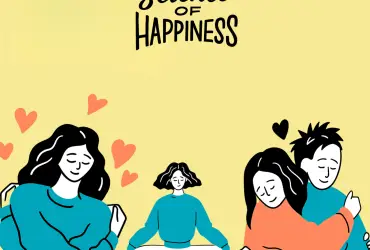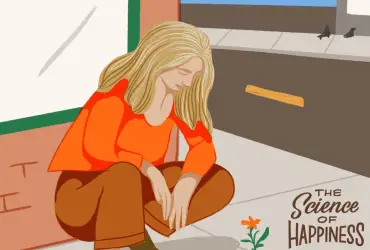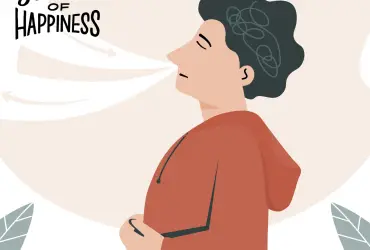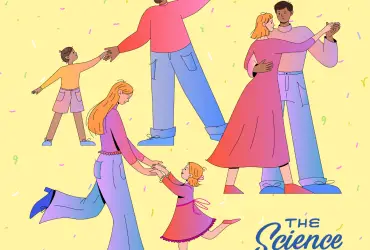Scroll down for a transcription of this episode.
Self-compassion reduces our feelings of shame and self-doubt. We explore a practice to help quiet our inner critic with kindness.
Link to episode transcript: https://tinyurl.com/ytek6jxk
Episode summary:
What does your inner critic sound like? For René Brooks, it’s the adults who misunderstood her ADHD symptoms as a child, before she was diagnosed later in life. For our show, René tried a self-compassionate writing exercise that helped her re-examine how she treats herself in difficult situations. She highlights why self-compassion is so important for marginalized communities in particular, and how as a Black woman, she puts double the pressure on herself to achieve and has come to use shame and self-judgment to motivate herself. The practice helps her to disrupt that tendency by noticing the way she speaks to herself and learning to take a more compassionate tone, instead. Later, we hear from psychologist Serena Chen, who expands on how cultivating self-compassion can help us embrace our true selves, which can lead to greater life satisfaction, increased well-being and closer social relationships.
Practice:
Learn more about this practice at Greater Good In Action:
- Think of something that makes you feel guilty, ashamed or insecure.
- Notice how you feel and write down your emotions.
- Imagine someone who loves you unconditionally and write a letter to yourself from their perspective, using the tone they would use with you, and expressing acceptance and understanding. Acknowledge that no one is perfect and there are likely many people struggling with the very same thing you are.
- In a compassionate way, ask yourself whether there are things that you could do to improve or better cope with this negative aspect. Focus on how constructive changes could make you feel happier, healthier, or more fulfilled, and avoid judging yourself.
- Try to complete the practice on a weekly or monthly basis.
https://ggia.berkeley.edu/practice/self_compassionate_letter
Today’s guests:
René Brooks is the creator of the blog Black Girl, Lost Keys. She draws on her personal experiences to coach and assist adults with ADHD.
Visit René’s Blog:
https://blackgirllostkeys.com/
Follow René on Twitter:
https://tinyurl.com/2p9caj5v
Follow René on Instagram:
https://tinyurl.com/3a96882u
Follow René on Facebook:
https://www.facebook.com/blackgirllostkeys/
Serena Chen is the Chair of the Psychology department at UC Berkeley. Her research is focused on self-compassion, wellbeing, and social interaction.
Learn more about Serena and her work:
https://tinyurl.com/mry3vx3v
Follow Serena on Google Scholar:
https://tinyurl.com/3btm3jn8
Resources from The Greater Good Science Center:
The Five Myths of Self-Compassion:
https://tinyurl.com/4tfp7d73
Why Self-Compassion Trumps Self-Esteem:
https://tinyurl.com/5a6phdx3
Why Is Self-Compassion So Hard for Some People?
https://tinyurl.com/2x4v3r72
The Three Components of Self-Compassion:
https://tinyurl.com/mwa2zddp
Want to Change your Life? Try Self-Compassion:
https://tinyurl.com/2y2ryc6m
More Resources on Self-Compassion
Happiness Break: How to Be Your Own Best Friend, with Kristin Neff:
https://tinyurl.com/3fj4yfrn
TED - Dare to rewire your brain for self-compassion:
https://tinyurl.com/yc2ru73p
Harvard Health - The power of self-compassion:
https://tinyurl.com/yc7usmx5
BBC - Why self-compassion – not self-esteem – leads to success:
https://tinyurl.com/yj2zax8x
How have you tried practicing self-compassion? Email us at happinesspod@berkeley.edu or use the hashtag #happinesspod to tell us about it.
Help us share The Science of Happiness! Rate and follow us on Spotify, and share this episode with a friend: https://tinyurl.com/4uyr2w35
Transcription:
René Brooks: I had a teacher scream at me at the top of his lungs when I was in middle school about not doing homework and about how I was never going to get anything right, and about how I was too stupid to turn my work in on time.
So I told my mother, and of course she brought herself up to the school to tell them not to talk to me like that at all — and maybe a week or two later he was frustrated with me again and let me have it again and said, “And don’t bother to tell your mother.” And I didn’t. When you go out in the community and you talk to people with ADHD, I think no matter what our symptoms are, there are a ton of us who experience a lot of overwhelming shame about it. Especially if you grow into adulthood undiagnosed because people are wondering why you can’t be on time, why you’re not organized, why everything around you is always chaos and you don’t know why either.
It’s easy to internalize those types of messages to get really shaming and blaming with yourself and go, okay, well, even though I’m trying really hard, this isn’t working out, maybe I’m just broken.
Dacher Keltner: I’m Dacher Keltner. This is the Science of Happiness.
Today we’re talking about shame, self-compassion, neurodivergence, and where they intersect. Here to join us is René Brooks, the creator of Black Girl, Lost Keys. A blog and online coaching business for adults living with ADHD.
René knows all about how the symptoms of ADHD can affect people’s lives. But she still struggles with her inner critic, and has a tendency to shame and blame herself anytime she doesn’t live up to her own expectations.
For our show, René tried a writing practice shown to increase self-compassion.
And later, psychologist, dear friend and returning guest Serena Chen shares the connection between self-compassion and authenticity, the feeling that we’re not trying to be anybody but ourselves.
Serena Chen: Self-compassion — the various things that it does to how we treat and view ourselves may well actually encourage greater authenticity which itself has so many benefits.
Dacher Keltner: More on how to be kinder to ourselves, after this break.
Welcome back to The Science of Happiness, I’m Dacher Keltner. Today we’re joined by René Brooks, the founder of Black Girl, Lost Keys. René has lived with ADHD her whole life, but didn’t learn about her diagnosis until she was an adult.
A lifetime of being misunderstood by others has led her to have a really harsh internal critic. So for our show today, René tried writing herself a self-compassionate letter, where you identify something you feel ashamed about and write about it with understanding, acceptance, and kindness. Treating yourself as you would a dear friend.
René, thanks for joining us.
René Brooks: Thank you so much for having me. I really appreciate you having me on.
Dacher Keltner: So René, I’m curious what drew you to the self-compassionate letter exercise and why you wanted to do it at this present moment?
René Brooks: So a lot of people with ADHD walk around and live with this overwhelming sense of shame over like — ADHD can create some pretty embarrassing scenarios. You’re looking forward to a friend’s baby shower and maybe you forget or you don’t know how to get there because you lost the invitation. Or maybe you have a presentation that doesn’t go as well as you wanted because you spent the whole night up trying to get ready for the presentation because you waited too long. When you don’t show up for someone, they don’t really care why you didn’t show up. They care that you weren’t there for them. They think that if what is happening is important enough, you will do the thing. And that’s not how ADHD works. So like anytime there’s a problem, we’re often internalizing that rather than being able to look at that and say, maybe it’s just the symptoms. So for me, the challenge has been with my self-talk, how I talk about myself, when I’m disappointed with my result.
Dacher Keltner: Yeah. It’s profound. I’m curious, you know, with the self-compassionate letter exercise you do identify something you feel ashamed about and write about the thing, and then you write, you know, to yourself in a compassionate voice with acceptance and then you come back to the letter and reread it and see how you’re feeling. How did this go for you? What’d you write?
René Brooks: I wrote about how I struggle with conflict. The part that I struggle with is when I’m walking away from conflict, feeling like I didn’t appropriately stand up for myself and my points. And I usually do walk away. Like, there you go, you did it again. You didn’t say anything. You’re letting them run over you. Why are you doing this?
Dacher Keltner: Would you mind reading us your letter or some part of it?
René Brooks: I will, I’ll read you the intro.
René Brooks: “I know how embarrassed you feel when you don’t stick up for yourself. That sting of self betrayal. The shame of letting someone get over on you. The guilt because no matter how many times you’ve tried to overcome that, you’re still afraid that if you open your mouth you’ll ruin everything. Or worse, no one will care at all.”
Dacher Keltner: Hmm. Ouch. Was there a specific conflict and moment that you wrote about?
René Brooks: Oh my gosh. Not anything in particular, but I can tell you for sure when people say silly stuff to me on the internet and I don’t respond. And sometimes I just have to walk away from it because I am feeling so frustrated and emotional over what was said that I don’t quite know how to get there. And I think it comes from growing up in a household where there’s a lot of verbal abuse present, a lot of anger present — you learn to very carefully choose your battles.
And sometimes you’re not sure if that battle is worth the risk. And I think sitting in that emotion too long can, you know, sometimes the moment is lost where you should have said something.
Dacher Keltner: Yeah. It’s hard for a child to back down from a conflict and all the condemnation that comes from that. One of the things I love about the exercise, and I’m curious what surfaced for you, René, is you find a voice, a tone, words of someone who loves you. Did anyone come to mind as you did the exercise of where you heard this loving voice directed at you?
René Brooks: You know, it’s funny because it was still my own voice, but it was like when I thought about how I wanted to write to myself, like I, you know, I do coaching, I talk to hundreds of people every day and I thought like, what if this was someone who came to you and was in trouble
Dacher Keltner: Exactly.
René Brooks: And you are in trouble when you’re in this kind of shame, like, soup. You’re just sitting there, it’s toxic. It feels like shit and you can’t seem to pull yourself out of it.
Dacher Keltner: What were some of the specific things that you said to yourself in that compassionate tone?
René Brooks: One of the things that I said to myself was you need to stop calling yourself a coward when you make a mistake because you already do stick up for yourself. Like you have a whole brand that you created around you finding the way to say, “This is what happened to me and I want to talk about it so it doesn’t happen to anyone else.”
That’s bravery.
I think the thing that I discovered in the exercise, one of the things I wrote was, “You’ve spent so much time having to hold your tongue to protect yourself.” And it was like, you know, things logically, but sometimes saying them out loud or seeing them in writing, the truth of it just kind of hits you in that place in yourself that maybe doesn’t respond to logic in those feelings in that emotional place.
And I was like, oh wow, that’s true. That was me trying to protect myself when maybe I didn’t know how to advocate for myself when I didn’t know how to use my voice. And maybe I’m projecting that onto myself that I shouldn’t speak, that I can’t speak, but I’m not that same child anymore. I know how to use my voice. I know how to advocate for myself, so it really pulled me out of that place and saw what I saw as a shame, as survival. This is what you needed to get to where you are now. And now you can say whatever you want.
Dacher Keltner: Yeah. That’s really cool. There’s a lot of research by Kristen Neff and others just showing this self-compassionate letter exercise. You do it for a couple of months and it kind of makes you more aware of those problematic voices in your mind that undermine our efforts in the world. You know, you feel a bit better about life. How’d it go for you?
René Brooks: It did feel that way and the thing it almost like it was like, oh my God, do you really think this way about yourself? And it was like, yeah, you really do. You do say those things to yourself. I was like shocked because, you know, it’s an internal process, so you’re not always like verbally speaking to yourself. You’re just kind of feeling those things and it’s like, oh, you do think you’re a coward when you haven’t responded to a random stranger on the internet who doesn’t know you and doesn’t seem to understand what you’re trying to accomplish here. That’s ridiculous.
Dacher Keltner: It is ridiculous.
René Brooks: It really helped me to get over some of that guilt. It was like you’re guilting yourself and you’re assigning these negative labels to yourself when really like, this is just, this is something you’ve not looked closely enough at ever to really identify the reasons why you struggle with feeling like you can respond in the moment, and that’s really not fair to yourself.
So I walked away feeling like I learned something new about myself that was sitting right underneath the surface I had no idea that was sitting in my subconscious waiting on me.
Dacher Keltner: I hear you. I’ve had the same experience. Just as a final question, you know, you’re doing this cutting edge work to empower black women who are living with ADHD, you know, I’m curious how you’re integrating the lessons of self-compassion into that work and, and where you think it’s really useful and relevant?
René Brooks: I think that Black people are on the frontier of a mental health revolution, and if I’ve been a part of helping to further that conversation at all, that’s a real honor.
I think when you’re trying to run from systemic racism and you’re trying to survive microaggressions in every place of your life, there’s not a lot of time for this kind of self-compassion. And I think having an exercise that gives someone a task to focus on like, it sounds cheesy to write a letter to yourself. It wasn’t cheesy. And I hope that other people are gonna take a chance on it because self-compassion is something that we are desperately in need of. When you have to work twice as hard to get anything done, you have to push yourself. And some of us only know how to motivate ourselves through negativity, like shame and blame and anger. And I think this can be a starting point for seeing what you need to replace those things with instead.
Dacher Keltner: Well, René Brooks, I want to thank you for being on our show. I want to thank you for your cutting edge work in diversifying our mental health world, uh, desperately in need of your voice. Thank you.
René Brooks: Thank you.
Dacher Keltner: Who in your life do you wish greater self-compassion for? Share this episode with them on Spotify, or wherever you’re listening right now.
Up next on The Science of Happiness, we explore the link between self-compassion and authenticity.
Serena Chen: Authenticity is related, it’s correlated with wellbeing, satisfaction with life and so forth. And so it dawned on us that self-compassion may well actually encourage greater authenticity.
Dacher Keltner: More, after the break.
Welcome back to The Science of Happiness, I’m Dacher Keltner. We’ve been talking about self-compassion, and how it can help to alter our self-talk.
All of us have internalized negative feedback to some degree or another. What matters is what happens when you start to believe the negative things other people have said about you. For people with neurodivergence and people of color, this can be especially brutal. And it can really take a toll on how comfortable we feel in our own skin. Or in other words, our sense of authenticity.
Serena Chen: Authenticity is when people feel like they can be their true self. The authentic person is comfortable in their own skin. You know, they’re not fidgeting, they’re vulnerable, they’re not afraid to look silly or to admit mistakes.
Dacher Keltner: Serena Chen chairs the Psychology department here at UC Berkeley, and she’s an expert on self-compassion.
Serena Chen: Authenticity is related, it’s correlated with wellbeing, satisfaction with life and so forth, but also interpersonal benefits. So being authentic is good for one’s relationships. It’s good for bonding, it’s good for generating closeness.
Dacher Keltner: Serena says this overlaps with self-compassion, which has to do with being kind, understanding, and non-judgmental towards ourselves.
Serena Chen: There was so much research about how important authenticity is for our wellbeing, but not necessarily about how to increase authenticity. And so it dawned on us that self-compassion, the various things that it does to how we treat and view ourselves may well actually encourage greater authenticity.
Dacher Keltner: Serena and her colleagues invited 297 undergrads to their lab, and asked them all to write a letter to themselves about a personal weakness.
Serena Chen: So we’re having everybody sort of stew about something that happened to them. A shortcoming, a failure, a setback.
Dacher Keltner: But some were assigned to write in a self-compassionate way, with understanding, and without judgment.
Then, they had everyone answer survey questions to measure how authentic they felt after writing this letter.
Serena Chen: How much do you feel like you can be your true self right now?
Those participants who are nudged to think about their failure in a self-compassionate way. They’re the ones reporting highest authenticity.
Dacher Keltner: Serena and her colleagues found the link was strongest when they were the least worried about what others thought about them.
Serena Chen: Self-compassion might breed greater authenticity because it helps lower people’s fear of negative evaluation.
Dacher Keltner: They found that shame did not have much of an effect on the relationship between authenticity and self-compassion. But for some people, optimism was an important factor.
Serena Chen: I don’t think one size has to fit all. And our studies show that sometimes
for some people, I may hide parts of myself because I’m fearing what other people think. For other people, the main reason I’m not authentic. It’s because I’m not very optimistic. I don’t think things are gonna go well if I actually show my true self.
Dacher Keltner: Self-compassion isn’t necessarily a trait we’re born with, but it can be learned through practices like writing a self-compassionate letter. Especially if you do it regularly for a few months.
Serena Chen: There’s lots of evidence suggesting that it’s not that hard to learn to be self-compassionate, except that like many things, it takes a lot of practice for something to become the default response you got to practice. But what’s exciting about this work is that it’s this amazing side effect to me that there is this benefit, this extra side benefit of it also potentially helping them to boost their authenticity, which itself has so many benefits.
Dacher Keltner: Do you know someone who struggles with negative self-talk? Or who could use more self-kindness? Share this episode with them on Spotify. You can find a link in our show notes.
Next time on The Science of Happiness, we explore the science of our five senses — and how prioritizing our sensory experience can lead us down a path toward greater happiness.
Gretchen Rubin: My eye doctor said to me you’re at greater risk for losing your vision. So I was walking home and it was like every knob in my brain was jammed up to maximum and I thought, this is this psychedelic experience, but this is around me all the time and I just have been taking it for granted. I’m stuck in my head. And I needed to get back out into engaging with the world and other people and myself, through my five senses.
Dacher Keltner: What are your thoughts about self-compassion? We’d love to hear from you — we read every email and social media post. Write to us at happinesspod@berkeley.edu, or use the hashtag Happinesspod.
I’m Dacher Keltner. Thanks for joining us on The Science of Happiness.
Our Executive Producer of Audio is Shuka Kalantari. Our producer is Haley Gray. Sound designer Jennie Cataldo of Accompany Studios. And our Associate Producers for this episode were Bria Suggs and Maarya Zafar. Our editor in chief is Jason Marsh. The Science of Happiness is a co-production of UC Berkeley’s Greater Good Science Center and PRX.









Comments